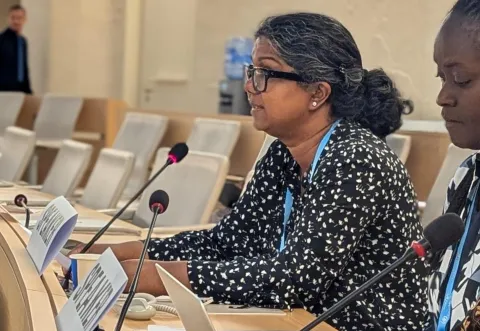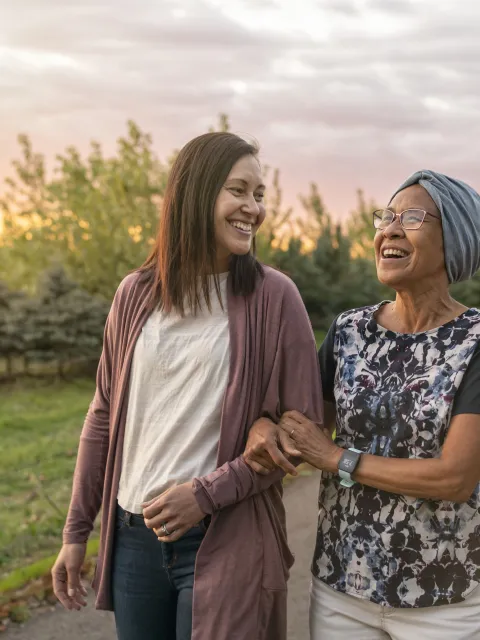WHA78 charts a path towards more equitable, sustainable global health systems
At the recent 78th World Health Assembly (WHA), governments adopted a new pandemic agreement, approved a strengthened WHO budget, and endorsed updated policies on air pollution and lung health – with implications for cancer control and health equity, as highlighted by UICC who hosted several side-events on lung cancer, AMR, and access to medicines.

The 78th World Health Assembly (WHA78), held in Geneva from 20–28 May 2025, concluded with several important decisions aimed at reinforcing global health cooperation and building sustainable systems moving forwards.
Among the most prominent outcomes was the adoption of the first-ever Pandemic Agreement – a legally binding framework to support more coordinated, equitable responses to future global health emergencies, complementing the existing international health regulations (IHRs).
According to WHO, the agreement establishes mechanisms to ensure rapid and fair access to vaccines, diagnostics, and therapeutics, including a Pathogen Access and Benefit-Sharing (PABS) system. The PABS system, which will be developed at a forthcoming Conference of the Parties, is designed to make sure that when dangerous viruses are discovered, countries quickly share information and samples – while ensuring that the resulting vaccines and treatments are distributed to countries equitably.
Member States also agreed that at least 20% of these essential health tools should be reserved for lower-income countries, with half of this allocation provided through donations.
UICC, together with the NCD Alliance, advocated for the explicit recognition of people with NCDs – including cancer – as a vulnerable population requiring continuity of care in pandemics. While such specific language was not reflected in the final text, UICC welcomes the strong references to health system resilience and universal health coverage, and will continue to push for national pandemic strategies that integrate cancer and NCD services.
Indeed, as countries begin to implement the pandemic agreement, there is a key opportunity to ensure that national preparedness and response strategies reflect the needs of people living with cancer.
UICC encourages its members to engage in national advocacy efforts, particularly as governments begin developing plans that could integrate cancer and NCD services into broader health system resilience. There may also be scope to align future investments in regulatory systems and local pharmaceutical production – such as mRNA vaccine platforms – to support cancer control during and beyond health emergencies.
Impact of climate change, lung health resolution
Environmental health was another major focus at WHA78. Member States approved a Global Plan of Action on Climate Change and Health to address increasing risks from extreme weather, pollution, and vector-borne diseases, as well as committing to strengthen climate-resilient health infrastructure. They also adopted resolutions on hazardous chemicals and waste.
Member States also adopted an updated roadmap on air pollution, which calls for stricter emissions controls and greater cross-sector collaboration, and is designed to align national strategies with WHO air quality guidelines. Crucially, the resolution sets a global target to reduce by 50% the health impacts of air pollution by 2050s.
With air pollution now causing more deaths worldwide than tobacco, the need for stronger policy responses on lung health is becoming increasingly urgent.
In this context, the adoption of a resolution on integrated lung health – co-led by Malaysia and supported by UICC – was a particularly timely achievement, highlighting the need for national strategies that address the full spectrum of respiratory diseases, including lung cancer. This marks the first time lung cancer has been explicitly included in a WHA resolution, reflecting growing recognition of its public health significance as the leading cause of cancer mortality worldwide.
Advances on non-communicable diesease (NCD) and cancer
In preparation for the 2025 UN High-Level Meeting on NCDs, WHA78 reaffirmed the importance of prevention and early intervention. Vaccination was highlighted as a cost-effective strategy, particularly human papillomavirus (HPV) and hepatitis B vaccines, which are key tools in reducing the incidence of cervical and liver cancers. Discussions also focused on the importance of integrating NCD strategies within universal health coverage efforts.
Other developments at WHA78 included, and efforts to improve access to diagnostics and medical imaging. For cancer care, the latter holds particular promise in improving early detection and timely diagnosis in low-resource settings – an ongoing challenge in many countries.
UICC highlighted that improved access to diagnostics and imaging is critical to detect cancer in the early stages, when it is easier to treat successfully and less invasively. This is particularly urgent in low- and middle-income countries to avoid delays in diagnosis that impact survival, and notably for breast, cervical, and colorecta cancers, for which routine screening programmes have significantly improved survival rates where implemented. These actions are also aligned with WHO’s “best buys” for noncommunicable disease control.
Taken together, the outcomes of WHA78 reflect a growing convergence between emergency preparedness, environmental health, and NCD control. For organisations working in cancer and across public health, they present new opportunities to engage in multisectoral action and to advocate for policies that support prevention, equitable access, and resilient health systems.
Budget outcomes
In support of these policy ambitions, Member States also approved WHO’s base budget for 2026–2027, set at USD 4.2 billion, which includes a 20% increase in assessed contributions – the mandatory payments countries make based on their income and population size. This increase responds to longstanding calls for more sustainable and predictable financing for WHO, which has historically depended heavily on voluntary, often earmarked, contributions.
Despite a projected funding gap of USD 2.5 billion, Member States reiterated their commitment to maintaining country-level support and prioritising areas such as pandemic preparedness, universal health coverage, and noncommunicable diseases. China has stepped up significantly to fill the gap with a contribution of USD 500 million over five years.
There was strong support from Member States for WHO’s work on universal health coverage and noncommunicable diseases, including cancer – priority areas also central to ongoing negotiations for the 2025 UN High-Level Meeting on NCDs.
UICC will be encouraging governments to maintain or increase their investment in WHO to ensure sustained momentum in these areas. There is also cautious optimism that structural changes within WHO, notably the integration of previously separate NCD teams under a new department for health promotion, disease prevention and control, could lead to improved coordination.
UICC side-events
In addition to the high-level reception on lung cancer co-hosted with the Ministry of Health of Malaysia, UICC hosted a dedicated event on antimicrobial resistance (AMR) and cancer care, which brought together experts to explore joint strategies aligned with the 2024 Political Declaration on AMR, highlighting the role of civil society in advancing a comprehensive response.
The UICC-led Access to Oncology Medicines (ATOM) Coalition marked its third anniversary with a gathering of partners and country representatives to reflect on progress in expanding access to essential cancer medicines and to reaffirm commitments to country-led implementation.
UICC also presented a side-event on palliative care and access to controlled medicines, including a screening of Dignity of Breath, to raise awareness of the need for equitable access to essential pain relief.
Last update
Wednesday 28 May 2025
